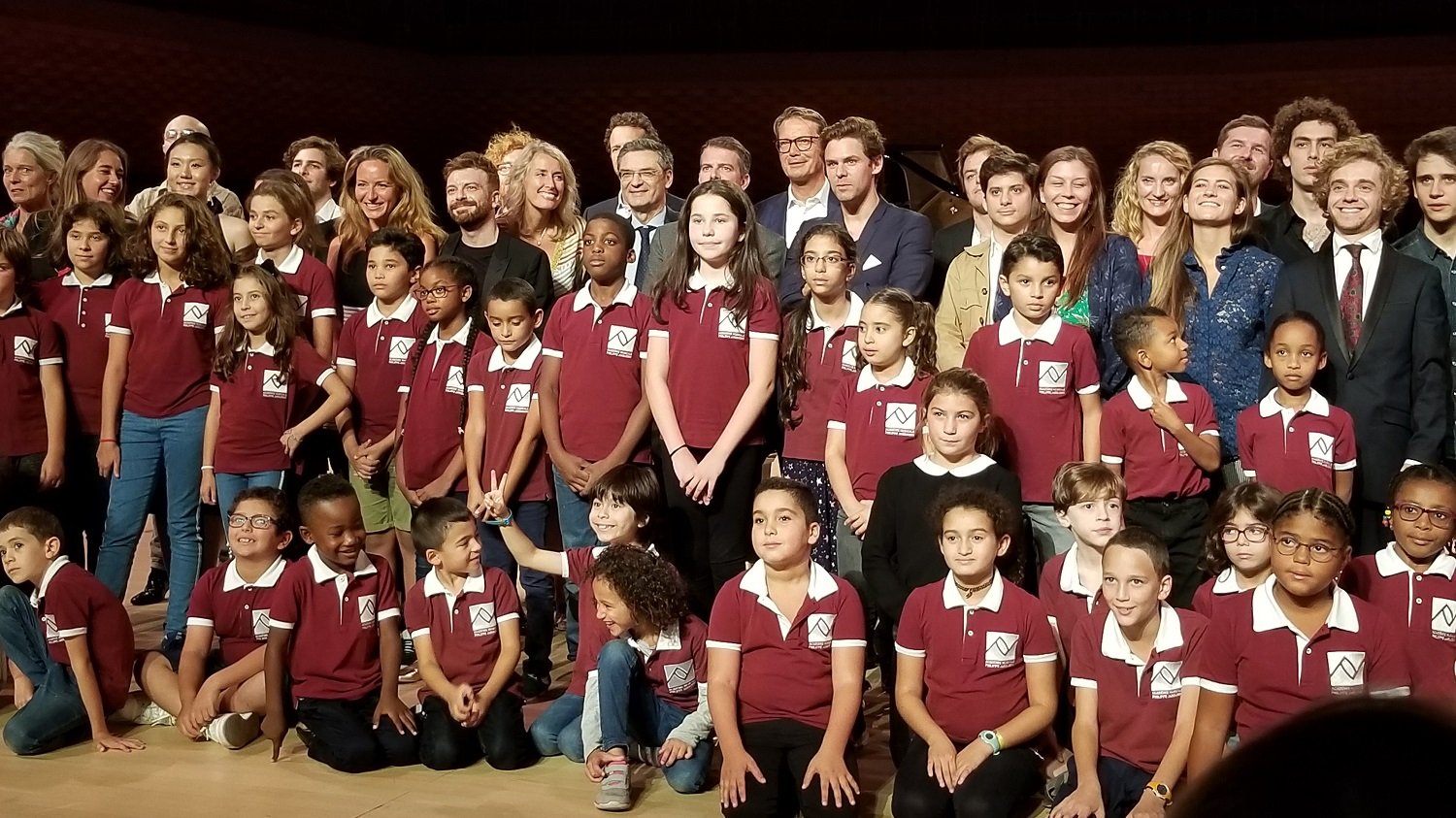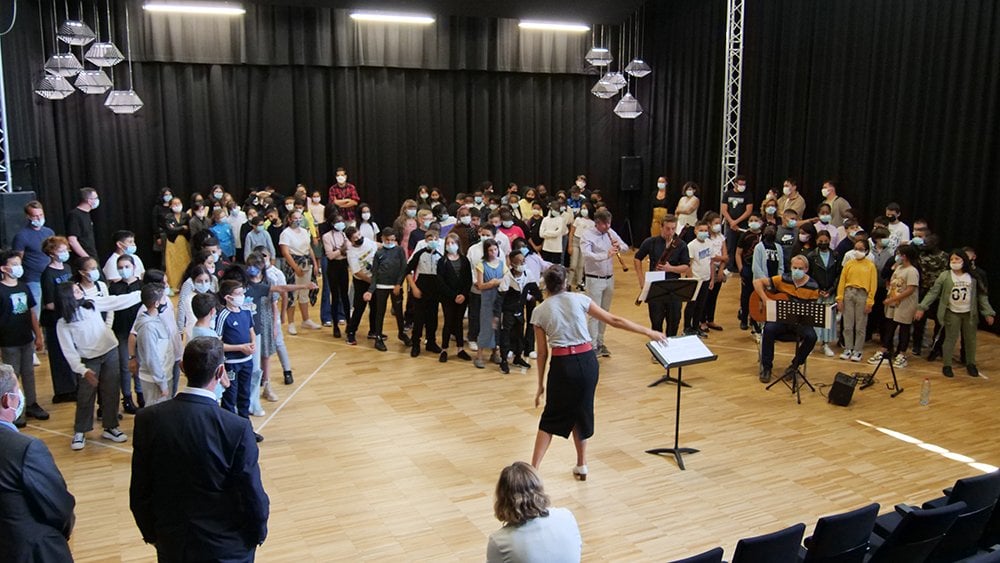Foundations committed to helping music thrive
Because it moves us, transports us and brings us together, we need music more than ever. On the International Music Day on October 1, we find out how three recent donor-advised funds decided to take action for and thanks to musical creation.
Fondation de France and music have long had a special relationship. This attachment is shared by close to 38 donor-advised funds who have chosen to place the world of music at the heart of their engagement. Every year, many supported projects encourage musicians, as well as audiences who are least likely to attend cultural events. Fondation de France also organizes large-scale events, such as the Laureates Concert, sponsored by seven donor-advised funds, which rewards future virtuoso musicians. More recently, whereas the pandemic had put a halt to entertainment and culture, Fondation de France and its donor-advised funds maintained and even reinforced their support for struggling musicians. It also created a one-off relief fund for artists. It was against this background that three recent foundations committed to supporting musical creation and musicians’ talent, making music an instrument of resilience.
Fondation de la Musique Avant Toute Chose (Music Before Everything) supports the talent of promising and confirmed artists.
Letting music thrive and trying to let it resonate where it is not expected is the mission of De la Musique Avant Toute Chose. With a name that recalls Verlaine's famous line, the foundation asserts the critical part music plays in society. “From the start, we wanted to support musicians and also broaden our work to reach categories of populations who may not choose classical music for cultural or financial reasons,” explains Daniel Morel, manager of Fondation De la Musique Avant Toute Chose, who adds that the foundation only exists thanks to the generosity of donors.
Since its creation in 2018, the foundation is eager to support future and confirmed talent. For example, it helps musicians purchase very high quality instruments that they would not be able to afford otherwise. It also encourages the practice of a musical instrument in young people struggling at school or from underprivileged backgrounds, who can also benefit from music lessons. That is the case in the Ile-de-France region, where, in partnership with the Académie Philippe Jarrousky, 75 children are introduced to the piano, violin or cello under the direction of a qualified teacher, for three years. At the outcome of which most of them join a conservatory. Keen to decompartmentalize practices, the foundation is also innovating by supporting original projects such as Classic Street. This initiative brings together young musicians from the Marseille conservatory and hip hop dancers, with a mixed artistic creation mingling classical music and urban dance. A video performance, also broadcast on social media, will take place by the end of the year.
During the pandemic, the foundation naturally maintained its social and pedagogical activities and reinforced targeted support. “We contributed to producing records, so that musicians’ careers didn’t come to an abrupt end, and artists could stay in the picture with media,” adds the foundation’s manager. “We also contributed to the Festival Solidaire de France Musique in the summer of 2020, which welcomed around a hundred artists, who were paid.” Music is meant to bring us together, perhaps more than ever right now,” he concludes.
 The Académie Jarrousky
The Académie Jarrousky
Musicians very committed to the community with Fondation Pour le Cercle de l’Harmonie:
Founded in June 2020, Fondation pour le Cercle de l’Harmonie lives by the saying that “virtuosity has no purpose in the absence of meaning”.
The Cercle de l’Harmonie, which has now acquired an international reputation, especially for amateurs of Mozart’s music, is a private ensemble of classical and Romantic music, which is played on original instruments of the period, and directed by the talented Jérémie Rhorer.
“The foundation was first created to support the development of the artistic project led by the Cercle de l’Harmonie,” explains Vincent Manuel, president of the Foundation. “For us, it was a good way to bring the donors together around our wish to broaden our repertory by opening it to other composers such as Berlioz, Brahms, Beethoven and digging up forgotten partitions from musical archives. The foundation also supports our residence at the Grand Théâtre de Provence in Aix, where we recorded a new piece dedicated to Brahms this year, which will come out in November.”
“Right from the start, in addition to its purely musical aspect, the foundation added social and pedagogical activities to its work. During their residency in Aix, musicians contributed to community life, with a quintet playing in a gerontology center and the psychiatric unit of the Montperrin teaching hospital. The foundation also organized concerts at the Grand Théâtre de Provence, for a younger audience of close to 900 children.
“Community involvement is an important element of the Cercle de l’Harmonie’s identity. It’s a way of getting people to understand our art better and of making it accessible to the greatest number. It adds meaning to what we do,” says Vincent Manuel. Since 2016, the Cercle de l’Harmonie has also teamed up with nonprofit Aurore, which offers emergency shelter, coming to these centers to introduce music to the children living there. In addition, another project based around music and sick young people is currently being developed via nonprofit L’Ecole à l’Hôpital (Hospital at School) and will be operational soon.
Fondation Concert d’Astrée is recreating interactions thanks to Baroque music
Another foundation created in the middle of the pandemic was Fondation Concert d’Astrée. The ensemble it supports, dedicated to Baroque music and directed by Emmanuelle Haïm, is celebrating its 20th anniversary this year. Although the reputation of Emmanuelle Haïm and the Concert d’Astrée is well established, it felt natural to set up a foundation as an ideal bridge between musical creation in the Concert on the one hand, and developing projects on the ground for those audiences not very familiar with culture on the other. According to foundation president François Bouvard: “The support aims to enable Concert d’Astrée to remain free in its artistic choices, give opportunities to young talents, invite the best directors, extend the reach of Baroque music in France and elsewhere and continue with its cultural mediation activities.”
Concert d’Astrée has been in residence in Lille since 2004 and is very involved in community projects in the north of France. For several years now, at the Miriam Makeba middle school, the musicians have introduced workshops for students. Working closely with their teachers, they have created shows based on Baroque music. “We’re lucky enough to be an ensemble with both instruments and voices, which makes the music accessible and very modern,” explains François Bouvard. With discovery sessions for little ones and concerts given by small ensembles in nursing homes, around a hundred cultural mediation projects are undertaken each year by Concert d’Astrée, thanks to the support of the Foundation.
Last year, at the end of the first lockdown, Concert d’Astrée contributed to the Unexpected Festival at the Lille Opera, where a broad audience could enjoy Idomeneo, taken from Campra’s opera, in such a way as to ensure that all health measures were complied with. “There are limits to screen-based culture. Finding yourself in an audience enjoying a performance together is critical: music can create social unity and interaction, which our sponsors are keen to promote,” says François Bouvard.

TO FIND OUT MORE

